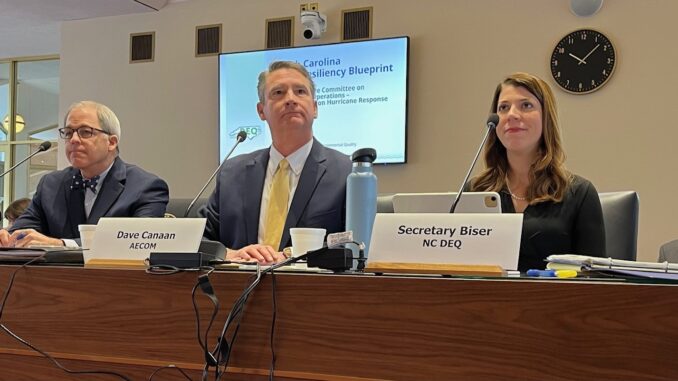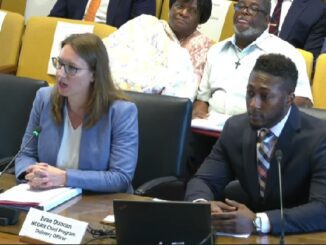
RALEIGH — At a hearing on Jan. 23, state lawmakers expressed a desire to see more progress from the N.C. Department of Environmental Quality (DEQ) on its Flood Resiliency Blueprint project.
The project was funded through the 2021-22 budget in order to identify major watersheds in the state that might be prone to flooding. The project includes assessing flood risks and then identifying data gaps that DEQ can base recommendations on how to reduce risks at the sites identified as presenting flooding issues.
The first focus area of the project is the Neuse River Basin.
The Joint Legislative Commission on Governmental Operations’ Subcommittee on Hurricane Response and Recovery invited DEQ Secretary Elizabeth Biser to testify as well as Dave Canaan and John Dorman, two representatives of AECOM, a company working on the project. Biser was also joined by Project Manager Todd Kennedy.
Biser was appointed by Gov. Roy Cooper in June 2021. She is the first female to lead the agency.
In the invitation letter to Biser to appear, lawmakers wanted to know about the Blueprint project’s timeline, the process to date, and the bidding process for hiring AECOM. Similar letters sent to the AECOM representatives asked about its role in the process and the timeline for the Blueprint project’s completion.
Both Biser and AECOM submitted written testimony ahead of the hearing with all parties reading that testimony in their opening remarks.
$20 million was allocated by the General Assembly in the 2021-22 budget for the Blueprint project, yet DEQ has only spent $1.9 million of it on what was described by Majority Leader Rep. John Bell (R-Wayne) as a “very, very rough draft.”
“Two years later, this committee wants to know where we are in that process and what progress DEQ made on this mandate,” Bell said to Biser. “How has the department spent the $20 million? What are problems and data gaps that have been identified?”
During the hearing, Biser called the Blueprint project a “novel product” that the state can use to mitigate flood issues in the years to come but also said the plan will require “tweaking” over time as the population of the state changes.
The Blueprint project’s draft has taken around 13 months and lawmakers pressed Biser on the matter. Biser said that a draft report was finished before the deadline last month.
Bell, who chaired the meeting, did not accept that answer.
“It was mentioned we have a very, very rough draft. I would think for about $2 million you should have a very good draft and then tweak as you move along,” Bell said. “I do think we’ll get there. It’s gonna take a while to get there, but we’ve got to move faster than what’s been happening.”
On the Blueprint deadline, Biser said DEQ is “building the plane as we’re flying it.”
“It’s a matter of when and not if we get another major storm event,” said Biser. “We’re working as quickly as possible with urgency because we know the floods aren’t going to wait on us. The timelines on this project were ambitious, and we have met those timelines and are on schedule.”
Per testimony by Biser, the final draft won’t be ready until rounds of input from some 150 stakeholders and “500 public comments” are taken.
Sen. Brent Jackson (R-Sampson) said he wants to see DEQ deliver a quality tool the state can use but with Hurricane season approaching this spring. He also expressed that he’d like to see DEQ speed up the process, to which Biser responded by saying they need more money.
The Blueprint project received $494,000 in the 2023-24 budget to hire six more temporary employees, however, Biser said those jobs are not filled yet.
Creation of an online tool that would guide decisions and strategies to combat flooding issues was also part of the Blueprint project, but that tool is apparently not ready yet. An additional $4 million was set aside to develop the tool. Biser and AECOM both indicated the beta version would be ready in April.
The Cooper administration has been criticized for its slow response and recovery efforts to Hurricane Matthew (2016) and Hurricane Florence (2018), in particular, ReBuild NC’s painfully slow rate of getting citizens back in their homes.
At the end of January 2023, following a series of legislative oversight hearings, the N.C. Department of Public Safety (DPS) announced Richard Trumper would become “Senior Advisor for Disaster Recovery” beginning the next month. At the time of the move, Trumper was the executive director of Disaster Recovery with the Office of State Budget and Management.
The DPS press statement said Trumper would work with the N.C. Office of Recovery and Resiliency and N.C. Emergency Management to get disaster victims “back in their homes faster.”
In 2022, Hurricane Matthew recovery efforts were audited by the U.S. Department of Housing and Urban Development. The audit revealed slow spending of federal funds. Specifically, North Carolina had only utilized $145 million out of the allocated $237 million.


